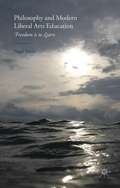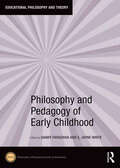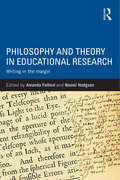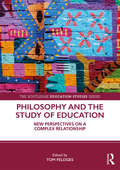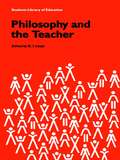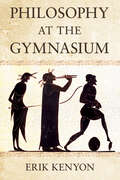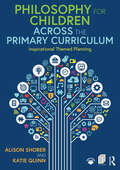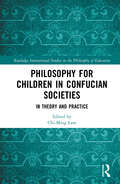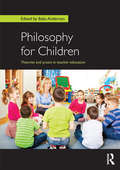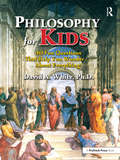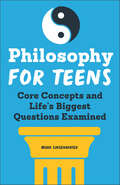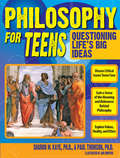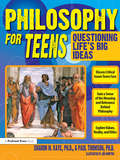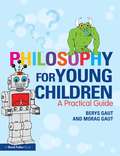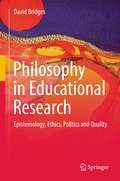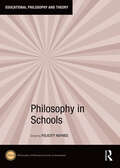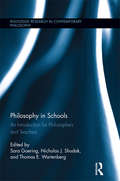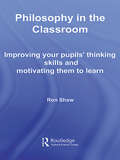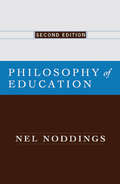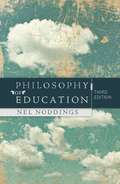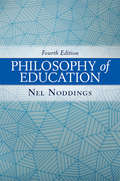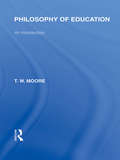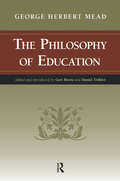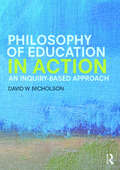- Table View
- List View
Philosophy and Modern Liberal Arts Education
by Nigel TubbsThis book argues for a modern version of liberal arts education, exploring first principles within the divine comedy of educational logic. By reforming the three philosophies of metaphysics, nature and ethics upon which liberal arts education is based, Tubbs offers a profound transatlantic philosophical and educational challenge to the subject.
Philosophy and Pedagogy of Early Childhood (ISSN)
by Sandy Farquhar and E. Jayne WhiteIn recent years, new discourses have emerged to inform the philosophy and pedagogy of early childhood. This collection brings together contributions from leading scholars in early childhood education, and each chapter engages with the critical task of reformulating early childhood education and the philosophy of the child with a specific focus on pedagogy. The contributors to Philosophy and Pedagogy of Early Childhood explore pedagogy through a philosophical lens, and discuss themes including intersubjectivity, alterity, ethics, and creative experience. Although these themes are addressed in very different ways, each invokes a call to teachers to consider their own position in the dialogical process of learning, and suggests that pedagogy is necessarily situated, provisional, compositional, and discursive. Such critical and philosophical inquiry is a welcome antidote in an era of pedagogical certainty and standards-based agendas. This book was originally published as a special issue of Educational Philosophy and Theory.
Philosophy and Theory in Educational Research: Writing in the margin
by Naomi Hodgson Amanda FulfordPhilosophy and Theory in Educational Research: Writing in the margin explores the practices of reading and writing in educational philosophy and theory. Showing that there is no ‘right way’ to approach research in educational philosophy, but illustrating its possibilities, this text invites an engagement with philosophy as a possibility – and opening possibilities – for educational research. Drawing on their own research and theoretical and philosophical sources, the authors investigate the important issue of what it means to read and write when there is no prescribed structure. Innovative in its contribution to the literature, this edited volume enlightens readers in three ways. The volume focuses on the practices of reading and writing that are central to research in educational philosophy, suggesting that these practices constitute the research, rather than simply reporting it. It is not a prescriptive guide and should not be read procedurally. Rather, it is intended to illustrate the possibilities for this kind of research, and to suggest starting points for those pursuing research projects. Finally, attention is given to the ways in which conducting educational philosophy can be educative in itself, both to the researcher in writing it, and to its audience in reading it. With contributions from international scholars in the field of educational philosophy, this book is a valuable guide for practitioner-researchers, taught postgraduate and doctoral students, and early career researchers in university education departments. Academic staff teaching research methods and seeking to introduce their students to philosophy-as-research without wishing to offer a prescriptive ‘how to’ guide will also find this book of particular interest.
Philosophy and the Study of Education: New Perspectives on a Complex Relationship (The Routledge Education Studies Series)
by Tom FeldgesCombining contributions from international academics and practitioners, this new text develops students’ ability to philosophise as well as learn about philosophy and education. It considers issues concerned with the interface between education and wider society but goes beyond this to explore education and philosophy at a micro level: the teacher–learner relationship. It challenges and empowers students to use philosophy as a tool within education, as a set of theories to understand education and as a potential means to develop solutions to problems as they occur within practice. Assuming no pre-existing philosophical background, Philosophy and the Study of Education explores complex topics including: encouraging young people to criticise and challenge all authority; the limits of a religious-based education; the desire for ‘alternative facts’ or ‘truths’; the second-class status of vocational pursuits; the inherent struggle in the teacher–student relationship; the relationship between emotion, morality and autonomy in teaching. Including discussion questions and further recommended reading, this thought-providing book will support and inspire all those on Education Studies, Childhood Studies and Youth Studies courses in developing a critical perspective and understanding the true value of philosophy within education.
Philosophy and the Teacher (Students Library Of Education Ser.)
by D. I. LloydFirst published in 1976. Routledge is an imprint of Taylor & Francis, an informa company.
Philosophy at the Gymnasium
by Erik KenyonPhilosophy at the Gymnasium returns Greek moral philosophy to its original context—the gyms of Athens—to understand how training for the body sparked training for the mind. The result is an engaging inroad to Greek thought that wrestles with big questions about life, happiness, and education, while providing fresh perspectives on standing scholarly debates.In Philosophy at the Gymnasium, Erik Kenyon reveals the egalitarian spirit of the ancient gym, in which clothes—and with them, social markers—are shed at the door, leaving individuals to compete based on their physical and intellectual merits alone. The work opens with Socratic dialogues set in gyms that call for reform in character education. It explores Plato's moral and political philosophy through the lens of mental and civic health. And it holds up Olympic victors as Aristotle's model for the life of happiness through training.
Philosophy for Children Across the Primary Curriculum: Inspirational Themed Planning
by Katie Quinn Alison ShorerThis is an easy-to-use, theme-based resource book for Philosophy for Children (P4C) practitioners in primary school settings. It covers ten popular themes which include many current affair issues and enduring curriculum themes such as artificial intelligence, biodiversity, resilience, and waste. Each theme provides planning for every subject and links to the relevant English national curriculum expectations. Offering ideas for a year’s worth of work, it can be dipped into for inspiration or used for step-by-step sessions. There are links to video clips, websites, and stories that teachers and practitioners can use to base their concept exploration and enquires on. Presenting a range of philosophical ideas, activities, and resources, this book is essential for all primary P4C facilitators excited by embedding and exploring philosophy across the curriculum.
Philosophy for Children Across the Primary Curriculum: Inspirational Themed Planning
by Katie Quinn Alison ShorerThis is an easy-to-use, theme-based resource book for Philosophy for Children (P4C) practitioners in primary school settings. It covers ten popular themes which include many current affair issues and enduring curriculum themes such as artificial intelligence, biodiversity, resilience, and waste.Each theme provides planning for every subject and links to the relevant English national curriculum expectations. Offering ideas for a year’s worth of work, it can be dipped into for inspiration or used for step-by-step sessions. There are links to video clips, websites, and stories that teachers and practitioners can use to base their concept exploration and enquires on.Presenting a range of philosophical ideas, activities, and resources, this book is essential for all primary P4C facilitators excited by embedding and exploring philosophy across the curriculum.
Philosophy for Children in Confucian Societies: In Theory and Practice (Routledge International Studies in the Philosophy of Education)
by Chi-Ming LamThis book contributes to the theory and practice of Philosophy for Children (P4C), with a special emphasis on theoretical and practical issues confronting researchers and practitioners working in contexts that are strongly influenced by Confucian values and norms. It includes writings by prominent P4C scholars from four Confucian societies, viz., Mainland China, Hong Kong, Taiwan, and Japan. These writings showcase the diversity of the P4C model, providing a platform for researchers and practitioners to tell their stories in their own Confucian cultural contexts. The research stories in the first part of the book are concerned with assessing the impact of traditional Confucian norms, promoting critical thinking, reconstructing the notion of community of inquiry, creating moral winds, integrating philosophy into the school curriculum, and localizing teaching methods and materials. Four issues are discussed in the second part of the book: the tension between Confucianism and powerful thinking; cultural challenges for practitioners; the transformation of harmony; and the conception of family. Taken as a whole, the book provides fresh insights into whether and how P4C’s Westerninfluenced theories and practices are compromised when they are applied in non-Western, or rather Confucian, contexts. A must-read for anyone interested in the theory and practice of P4C and Confucianism in general.
Philosophy for Children: Theories and praxis in teacher education
by Babs AndersonPhilosophy for Children (P4C) is a movement that teaches reasoning and argumentative skills to children of all ages. This book looks at the progress that P4C has made in the UK in addressing issues of literacy, critical thinking, PSHE, education for sustainable development and wider issues such as bullying. Chapters identify the different theories and practices that have emerged and discuss the necessity for a reflective approach that P4C brings to education. The book highlights how this movement can fit into the early years, primary and secondary curriculum and the challenges and rewards that come with it. Chapters include: The Evolution of Philosophy for Children in the UK Pedagogical Judgement Negotiating meaning in classrooms: P4C as an exemplar of dialogic pedagogy The impact of P4C on teacher educators Being and becoming a philosophical teacher This will be an invaluable guide for all those interested in P4C and studying courses on Early Childhood Studies, Education Studies and Initial Teacher Training courses.
Philosophy for Kids: 40 Fun Questions That Help You Wonder About Everything!
by David A. WhiteInspire animated discussions of questions that concern kids—and all of us—with this innovative, interactive book. Open your students' minds to the wonders of philosophy.Allow them to grapple with the questions philosophers have discussed since the ancient Greeks. Questions include: “Who are your friends?,” “Can computers think?,” “Can something logical not make sense?,” and “Can you think about nothing?” Young minds will find these questions to be both entertaining and informative. If you have ever wondered about questions like these, you are well on your way to becoming a philosopher!Philosophy for Kids offers young people the opportunity to become acquainted with the wonders of philosophy. Packed with exciting activities arranged around the topics of values, knowledge, reality, and critical thinking, this book can be used individually or by the whole class. Each activity allows kids to increase their understanding of philosophical concepts and issues and enjoy themselves at the same time. In addition to learning about a challenging subject, students philosophizing in a classroom setting, as well as the casual reader of Philosophy for Kids, will sharpen their ability to think critically about these and similar questions. Experiencing the enjoyment of philosophical thought enhances a young person's appreciation for the importance of reasoning throughout the traditional curriculum of subjects. The book includes activities, teaching tips, a glossary of terms, and suggestions for further reading.Grades 4-12
Philosophy for Teens: Core Concepts and Life's Biggest Questions Examined
by Mark LinsenmayerExplore philosophy through thought-provoking questions for teens If you like to ask deep questions about the world around you, then you already think like a philosopher. This book presents philosophy through fascinating questions you may have already thought about, like: Can we prove the existence of a God? What are minds, really? How can we be sure about anything? Ponder all these ideas and many more as you learn core philosophy concepts and strengthen your critical thinking skills.What sets this book about philosophy for kids ages 12 to 16 apart:An introduction to philosophy—Discover the history of philosophy, what makes a question philosophical in nature, and how being a philosopher can benefit you.The six main branches—Find questions organized by their branch of philosophy: metaphysics, epistemology, ethics, logic, aesthetics, and political philosophy.Philosophy in practice—Learn which philosophers asked and answered each question, explore different sides of an argument, and apply philosophical concepts to real life.Ponder life's biggest questions with this teen-friendly choice in philosophy books.
Philosophy for Teens: Questioning Life's Big Ideas
by Sharon M. Kaye Paul ThomsonWhat is love? Is lying always wrong? Is beauty a matter of fact, or a matter of taste? What is discrimination? The answers to these questions, and more, are examined in Philosophy for Teens: Questioning Life's Big Ideas, an in-depth, teenager-friendly look at the philosophy behind everyday issues. The authors examine some of life's biggest topics, such as lying, cheating, love, beauty, the role of government, hate, and prejudice. Both sides of the debates are covered on every issue, with information from some of the world's most noted philosophers included in a conversational style that teenagers will love. Each chapter includes discussions questions, thought experiments, exercises and activities, and community action steps to help students make reasoned, informed decisions about some of life's greatest debates.
Philosophy for Teens: Questioning Life's Big Ideas (Grades 7-12)
by Sharon M. Kaye Paul ThomsonWhat is love? Is lying always wrong? Is beauty a matter of fact, or a matter of taste? What is discrimination?The answers to these questions, and more, are examined in Philosophy for Teens: Questioning Life's Big Ideas, an in-depth, teenager-friendly look at the philosophy behind everyday issues. The authors examine some of life's biggest topics, such as:lying,cheating,love,beauty,the role of government,hate, andprejudice.Both sides of the debates are covered on every issue, with information from some of the world's most noted philosophers included in a conversational style that teenagers will love. Each chapter includes discussions questions, thought experiments, exercises and activities, and community action steps to help students make reasoned, informed decisions about some of life's greatest debates.Examining life's big ideas and discovering their own opinions have never been easier or more exciting for today's teens.Grades 7-12
Philosophy for Young Children: A Practical Guide
by Berys Gaut Morag GautWith this book, any teacher can start teaching philosophy to children today! Co-written by a professor of philosophy and a practising primary school teacher, Philosophy for Young Children is a concise, practical guide for teachers. It contains detailed session plans for 36 philosophical enquiries - enough for a year’s work - that have all been successfully tried, tested and enjoyed with young children from the age of three upwards. The enquiries explore a range of stimulating philosophical questions about fairness, the environment, friendship, inclusion, sharing, right and wrong, manners, beauty, pictures, the emotions, dreaming and reality. All the stories, drawings and photographs that you’ll need to carry out the enquiries are provided and can be used with your children directly from the book. Each step-by step enquiry includes: The philosophical topic and the aim of the enquiry The stimuli you’ll need Questions to ask the children Possible answers to help move the discussion forward Ideas to help you summarise and extend the enquiry. If you are an Early Years or primary school teacher, this complete resource will enable you to introduce philosophy to your children quickly and with confidence.
Philosophy in Educational Research
by David BridgesThis book provides critical and reflective discussions of a wide range of issues arising in education at the interface between philosophy, research, policy and practice. It addresses epistemological questions about the intellectual resources that underpin educational research, explores the relationship between philosophy and educational research, and examines debates about truth and truthfulness in educational research. Furthermore, it looks at issues to do with the relationship between research, practice and policy, and discusses questions about ethics and educational research. Finally, the book delves into the deeply contested area of research quality assessment. The book is based on extensive engagement in empirically based educational research projects and in the institutional and professional management of research, as well as in philosophical work. It clarifies what is at stake in international debates around educational research and teases out the nature of the arguments, and, where argument permits, the conclusions to which these point. The book discusses these familiar themes using less predictable sources and points of reference, such as: codes of social obligation in contemporary Egypt and New Zealand; the 'Soviet', and the inspiration of the nineteenth-century philosopher, Abai in contemporary Kazakhstan; seventeenth-century France, Pascal, and the disputes between Jesuits and Jansenites; eighteenth-century Italy, Giambattista Vico, and la scienzia nuova; 'educational magic' in traditional Ethiopia; and ends at a banquet with Socrates and dinner with wine and a conversation-loving Montaigne.
Philosophy in Schools (ISSN)
by Felicity HaynesIn 1972, Matthew Lipman founded the Institute of Advancement for Philosophy for Children (IAPC), producing a series of novels and teaching manuals promoting philosophical inquiry at all levels of schooling. The programme consisted of stories about children discussing traditional topics of ethics, values, logic, reality, perception, and politics, as they related to their own daily experiences. Philosophy for Children has been adapted beyond the IAPC texts, but the process remains one of an open community of inquiry in which teachers promote respect, conceptual clarity, critical judgement, and active listening without imposing their own ideas. Philosophy in Schools describes the successes and difficulties in implementing this community of inquiry model. The book covers topics including the formation of non-didactic courses in ethics, the difficulties of fitting a post-compulsory philosophy course into a standard curriculum framework, and the political assumptions of adopting this model in a low socio-economic school. The contributions also ask deeper questions about how a genuine community of inquiry model is incompatible with conventional models of schooling, with their positioning of the discipline of philosophy in the curriculum. This book was originally published as a special issue of Educational Philosophy and Theory.
Philosophy in Schools: An Introduction for Philosophers and Teachers (Routledge Studies in Contemporary Philosophy #47)
by Thomas E. Wartenberg Sara Goering Nicholas J. ShudakAll of us ponder the big and enduring human questions—Who am I? Am I free? What should I do? What is good? Is there justice? Is life meaningful?—but this kind of philosophical interrogation is rarely carefully explored or even taken seriously in most primary and secondary school settings. However, introducing philosophy to young people well before they get to college can help to develop and deepen critical and creative thinking, foster social and behavioral skills, and increase philosophical awareness. Philosophy in Schools: An Introduction Philosophers and Teachers is an invaluable resource for students and practitioners who wish to learn about the philosophy for children movement, and how to work its principles into their own classroom activities. The volume provides a wealth of practical information, including how to train educators to incorporate philosophy into their daily lessons, best practices and activity ideas for every grade level, and assessment strategies. With contributions from some of the best practitioners of philosophy for children, Philosophy in Schools is a must-have resource for students of philosophy and education alike.
Philosophy in the Classroom: Improving your Pupils' Thinking Skills and Motivating Them to Learn
by Ron ShawEver had difficulty inspiring your children to consider and discuss philosophical concepts? Philosophy in the Classroom helps teachers tap in to children’s natural wonder and curiosity. The practical lesson plans, built around Aesop’s fables, encourage children to formulate and express their own points of view, enabling you to lead rich and rewarding philosophical discussions in the primary classroom. This highly practical and engaging classroom companion: prompts students to consider serious moral issues in an imaginative and stimulating way uses Aesop's fables as a springboard to pose challenging questions about the issues raised provides fifteen key themes including happiness, wisdom, self-reliance and judging others as the basis for classroom discussion. uses powerful and creative drawings to illustrate activities and photocopiable resources. Philosophy in the Classroom is an invaluable resource for any primary school teacher wanting to engage their students in meaningful philosophical reflection and discussion. Ron Shaw has many years of classroom experience and is the author of more than forty books helping primary and secondary school students to improve their thinking skills.
Philosophy of Education
by Nel NoddingsThe first edition of Nel Noddings' Philosophy of Education was acclaimed as the "best overview in the field" by the journal Teaching Philosophy and predicted to "become the standard textbook in philosophy of education" by Educational Theory. This classic text, originally designed to give the education student a comprehensive look at philosophical thought in relation to teaching, learning, research, and educational policy, has now been updated to reflect the most current thinking in the field. A revised chapter on Logic and Critical Thinking makes the topic more accessible to students and examines how critical thinking plays a role in light of the new Common Core standards. Philosophy of Education introduces students to the evolution of educational thought, from the founding fathers to contemporary theorists, with consideration of both analytic and continental traditions. This is an essential text not only for teachers and future teachers, but also for anyone needing a survey of contemporary trends in philosophy of education.
Philosophy of Education
by Nel NoddingsThe first edition of Nel Noddings’ Philosophy of Education was acclaimed as the "best overview in the field” by the journal Teaching Philosophy and predicted to become "the standard textbook in philosophy of education” by Educational Theory. This classic text, originally designed to give the education student a comprehensive look at philosophical thought in relation to teaching, learning, research, and educational policy, has now been updated to reflect the most current thinking in the field. Features of the third edition include a new chapter on multiculturalism and cosmopolitanism in education, as well as updates on the latest work in care ethics. Philosophy of Education introduces students to the evolution of educational thought, from the founding fathers to contemporary theorists, with consideration of both analytic and continental traditions. This is an essential text not only for teachers and future teachers, but also for anyone needing a survey of contemporary trends in philosophy of education.
Philosophy of Education
by Nel NoddingsThe first edition of Nel Noddings' Philosophy of Education was acclaimed as the ?best overview in the field? by the journal Teaching Philosophy and predicted to ?become the standard textbook in philosophy of education? by Educational Theory. This classic text, originally designed to give the education student a comprehensive look at philosophical thought in relation to teaching, learning, research, and educational policy, has now been updated to reflect the most current thinking in the field. A revised chapter on Logic and Critical Thinking makes the topic more accessible to students and examines how critical thinking plays a role in light of the new Common Core standards.Philosophy of Education introduces students to the evolution of educational thought, from the founding fathers to contemporary theorists, with consideration of both analytic and continental traditions. This is an essential text not only for teachers and future teachers, but also for anyone needing a survey of contemporary trends in philosophy of education.
Philosophy of Education (International Library of the Philosophy of Education Volume 14): An Introduction
by Terence W. MooreThis volume provides an introduction to the philosophy of education, which will enable students meeting the subject for the first time to find their way among the many specialized volumes. It deals in a non-technical way with the more important issues raised in a philosophical approach to education, and gives a clear idea of the scope of the subject. After discussing different theories of the aims of education, whether mechanistic or organic, the author addresses practical issues - for example, about the curriculum, the distinction between education and indoctrination, the role of authority and discipline, and the place of religious and moral teaching. Finally he deals with some important aspects of education and the influence of different political structures on the philosophy of education.
Philosophy of Education (Routledge International Studies In The Philosophy Of Education Ser.)
by George Herbert Mead Gert J. Biesta Daniel TrohlerNever before published, this book features George Herbert Mead's illuminating lectures on the Philosophy of Education at the University of Chicago during the early 20th century. These lectures provide unique insight into Mead's educational thought and reveal how his early psychological writings on the social character of meaning and the social origin of reflective consciousness was central in the development of what Mead referred to as his social conception of education. The introduction to the book provides an overview of Mead's educational thought and places it against the wider social, intellectual, and historical background of modern educational concepts.
Philosophy of Education in Action: An Inquiry-Based Approach
by David W. NicholsonPhilosophy of Education in Action is an innovative, inquiry-based introductory text that invites readers to study philosophy of education through the lens of their own observations and experiences. Structured according to a "Wonder Model of Inquiry," each chapter begins by posing a fundamental What if question about curriculum, pedagogy, and the role of the school before investigating the various philosophical perspectives that guide and influence educational practices. Classroom vignettes and examples of actual schools and educational programs help to ground philosophical perspectives in real-world scenarios, while the book's unique inquiry-based approach leads students to both think critically about philosophical questions and apply the concepts to their own teaching. Features of the text include: What if questions that structure each chapter to pique students' curiosity, stimulate creativity, and promote critical thinking. Authentic classroom vignettes that encourage students to analyze what it means to "do" philosophy and to reflect upon their own practices, examine their role in the educational process, and articulate their own philosophical beliefs. A concluding section asking readers to imagine and design their own hypothetical school or classroom as a project-based means of analyzing, synthesizing, and evaluating the different philosophies discussed. Accessible and thought-provoking, Philosophy of Education in Action provides a dynamic learning experience for readers to understand and apply philosophy in educational practice.
